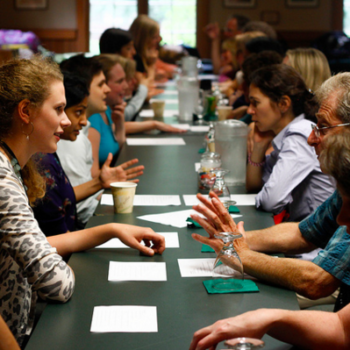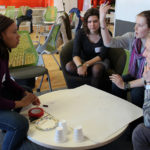This article was produced in partnership with Brown University’s TRI-Lab.
On a fall day in Providence, Brown University student Kate Nussenbaum watched her “scientific hero” Adele Diamond share research on child brain development with an audience of teachers, child care workers, Brown students, community leaders, and local policy makers.
Diamond, a cognitive neuroscientist at the University of British Columbia, discussed how children develop a particular set of skills, called executive functions, that are essential to success in school and throughout life. She also addressed a topic practitioners in the room were eager to hear about: what educators and caregivers can do to help children who lag behind.
Diamond’s presentation kicked off a day-long symposium in October 2014 that was the culmination of months of planning by a group of students (including Nussenbaum), professors, and leaders from local organizations. They were participants in a program called TRI-Lab that connects education and research to real-world problem solving.
TRI-Lab is part of a university-wide effort to foster collaboration between students, faculty, and the broader community and promote “engaged learning” that blends theory and practice.1 This new effort, the Engaged Scholars Program (ESP), expands the Brown educational experience by supporting students’ involvement in internships, volunteering, research, entrepreneurship, and other forms of experiential learning that complement their academic studies.
A key element of ESP is the integration of opportunities for research and practice into student concentrations (majors) within departments.(a) Another component is interdisciplinary programs like TRI-Lab, which has students collaborate with faculty and community leaders to learn about pressing challenges in the local community and pursue solutions to these problems.
The theme for TRI-Lab’s inaugural year was early childhood development, with a focus on the health and well-being of Rhode Island’s children.(b) Nussenbaum, who graduated in May with a degree in cognitive neuroscience and a focus on brain development, wanted to pursue engaged scholarship through TRI-Lab because of the unique chance it afforded to engage with the community outside the university.
“It seemed like the perfect opportunity to wrestle with some of the questions I had already been [considering] in a more tangible way,” Nussenbaum says. “How do I devote myself to research but still feel like I’m doing good in the world? How do I make sure the research I’m doing is relevant?”
Over the course of the year, she worked with and learned from fellow students specializing in cognitive science, public health, and urban education, as well as experts like Steve Buka, chair of the Department of Epidemiology at Brown’s School of Public Health, and Leslie Gell, director of Ready to Learn Providence, a local organization that works to improve early childhood education for low-income children.(c)
Nussenbaum, Gell, and Buka’s TRI-Lab group wanted to narrow their focus to a topic in child development that was of interest to both researchers and practitioners. Executive functions was a natural fit, as it has received a great deal of attention in both the academic and education worlds in recent years.
Executive functions are the cognitive processes by which our minds manage thought and behavior. They include the ability to juggle various pieces of information (working memory), to shift between thoughts and perspectives as a situation changes (cognitive flexibility), and to choose whether or not to engage in particular thoughts and actions (inhibitory control).
Almost everything we do that involves higher-level thinking relies on executive functions. They enable students to engage productively in class discussion, following the thread of conversation and contributing at the right moment. Studies have found that deficiencies in executive functions can lead to poor performance at school and work, substance abuse, violence, and a host of other challenges.2 Research3 has also shown that children from higher-income households perform better on tests of executive functions than children from lower-income households.(d)
This disparity has drawn the attention of educators because it may offer a potential explanation for – and possible solution to – the wide disparity in educational achievement between students from different socioeconomic backgrounds. If researchers and educators can figure out how to improve the executive functions of low-income children to match those of their high-income peers, we may begin to close the stubborn achievement gap.(e)
Solving this problem requires first closing another gap – between how academics think about “executive functions” and how the term is used in the early education world. By bringing together a diverse group of stakeholders, TRI-Lab revealed points of divergence between the worlds of research and practice. While both are concerned with similar problems and share common goals, they don’t communicate often and, when they do, they speak different languages.
The purpose of the TRI-Lab symposium – and the research brief the group produced to accompany it – was to close this gap and align practitioners and researchers on what executive functions are, why they matter, and how they can be improved.6 A corresponding goal was to encourage researchers who study executive functions to think about the educational needs and challenges of the community and how their research might be applied in the classroom and the home.
For practitioners like Leslie Gell, it’s the application of research that is most essential. Her organization recently received a $3 million dollar grant from the U.S. Department of Education to implement a program designed to strengthen executive functions in elementary schools across Providence.(f) Understanding the research on what works is essential for practitioners like Gell who are trying to improve executive functions among low-income children.7
As for Nussenbaum, she won a Rhodes Scholarship to study the science of attention, memory, and learning at Oxford. Seeing the myriad ways different people approached the same problem in TRI-Lab helped her realize that she wants to focus her efforts on research. The program also made a lasting impression on how she wants to conduct her academic work.
“Even though I’ve decided to pursue the research path, it’s really important to… be thinking about how this research can eventually be applied, how I can do work to make sure the applications of this research actually move forward,” says Nussenbaum. “Those are definitely questions that are going to remain on my mind.”
Another lesson Nussenbaum learned from her engaged scholarship at Brown? There are no easy answers to the question of how to connect academic research and real-world policy and practice. It was challenging for a group of people with diverse backgrounds, interests, and goals to come together and develop a high-impact project everyone could contribute to.
Yet while there may not be a clear-cut path for how to do this kind of work, it all starts with expanding student learning to the world beyond the classroom.
This article was produced in partnership with Brown University’s TRI-Lab.
Endnotes
- For more on the concept of engaged scholarship as it’s being developed at Brown see: Paxson, Christina (2015) “Letter From the President,” Brown Alumni Magazine, January/February; and Harlam, Alan (2015) “How Engaged Learning Can Invigorate Higher Education,” Footnote, March 19.
- Adele Diamond (2013) “Executive Functions,” Annual Review of Psychology, 64: 135-168.
- Khaled Sarsour, Margaret Sheridan, Douglas Jutte, Amani Nuru-Jeter, Stephen Hinshaw, and W. Thomas Boyce (2011) “Family Socioeconomic Status and Child Executive Functions: The Roles of Language, Home Environment, and Single Parenthood,” Journal of the International Neuropsychological Society, 17: 120-132. Daniel A. Hackman and Martha J. Farah (2008) “Socioeconomic status and the developing brain,” Trends in Cognitive Sciences, 13(2): 65-73.
- John R. Best and Patricia H. Miller (2010) “A developmental perspective on executive function,” Child Development, 81(6): 1641-1660.
- Center on the Developing Child at Harvard University (2011) “Building the Brain’s ‘Air Traffic Control’ System: How Early Experiences Shape the Development of Executive Function,” Cambridge, MA: Harvard.
- Kate Nussenbaum, Emily Davis, Nicole DellaRocco, Leanne Barrett, Stephen Buka, Elizabeth Burke Bryant, and Leslie Gell (2014) “Supporting the Development of Executive Functions in Young Children,” Healthy Early Childhood Development Policy Brief, Providence, RI: TRI-Lab, Brown University.
- Researchers have found that certain targeted enrichment programs can effectively improve executive functions in children, but the number of evaluations is still limited. Adele Diamond, Steven Barnett, Jessica Thomas, and Sarah Munro (2007) “Preschool Program Improves Cognitive Control,” Science, 318(5855): 1387-1388. Adele Diamond and Kathleen Lee (2011) “Interventions shown to aid executive function development in children 4-12 years old,” Science, 333(6045): 959-964.
Sidenotes
- (a) Brown’s Anthropology, Environmental Studies & Sciences, Engineering, Theater Arts & Performance Studies, and Public Policy departments are participating in the launch of ESP, and more departments will be added each year. Students concentrating in these disciplines have the opportunity choose the “engaged scholars” track, which incorporates engaged courses, practicums, and a capstone project within the discipline, as well as opportunities for interaction with engaged scholars from other fields.
- (b) Subsequent TRI-Lab projects have focused on access to healthy foods and the public health risks associated with climate change.
- (c) Nussenbaum also learned more about the Providence community outside the walls of her campus. She was surprised to learn, for example, that more children in the city are raised in single-parent than two-parent homes.
- (d) The unequal level of executive functions in children from different backgrounds is likely a result of the fact that these capabilities develop slowly in the brain.4 Their progress can therefore be disrupted by environmental factors such as exposure to stress, violence, and chaotic home environments, all of which are more prevalent in low-income households.5
- (e) The educational achievement gap is apparent across grade levels in Rhode Island. 58% of low-income fourth-graders have proficient reading skills and 48% have proficient math skills. Among higher-income fourth-graders, 83% are proficient in reading and 77% in math. 71% of low-income students and 93% of higher-income students in Rhode Island graduate from high school in four years.1
- (f) The program, called Mind in the Making, was developed by the Families and Work Institute based on a review of over a thousand academic studies and interviews with dozens of researchers. It aims to teach educators and parents what executive functions are and how they can help children cultivate these skills.





